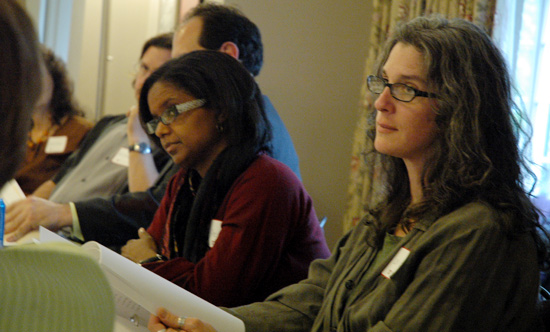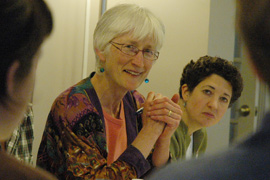Environmental Justice Explored at Workshop
 |
| At right, Lori Gruen, associate professor and chair of feminist, gender and sexuality studies, associate professor of philosophy at Wesleyan, spoke on Environmental Justice as a Feminist Issue during the Environmental Justice Curricular Workshop at Malcom X House May 9. |
| Posted 05/15/08 |
| In 1982, the State of North Carolina chose to dump 60,000 tons of PCB-contaminated soil into a landfill in Warren County. Residents felt the state had chosen their county because it was predominately black and one of the poorest in the state. As a result, the landfill became the focus of accusations of environmental racism, or racial discrimination towards enforcement of environmental regulations.
This topic and others were explored at the Wesleyansponsored Environmental Justice Curricular Workshop May 9. Fourteen scholars from the northeast gathered for the event to discuss environmental justice issues. In many ways, the workshop was a preview of a new course that will be taught jointly by faculty in African American Studies and Earth and Environmental Sciences, The workshop was aimed at bringing together a small number of professors from around New England to explore how environmental justice is currently being taught and to brainstorm about innovative and interdisciplinary approaches to bringing issues of environmental racism to students, says co-host Suzanne O’Connell, associate professor of earth and environmental sciences, director of the Service Learning Center. As far as we know, its the first time this has been done.
One of its tenets is that disenfranchised people, especially ethnic minorities, but also included are women and the poor, are more likely to be the recipients of environmental injustice, Romano says. The day-long workshop was broken into three sessions. The first explored how scholars in the humanities and social science fields are teaching environmental justice. Participants then examined teaching methods of featured scholars working in fields related to environmental science. The final session focused on the best practices for teaching environmental justice in ways that promote interaction across the disciplines and with the broader community.Workshop topics included Teaching Environmental Justice as a Law/Public Policy Issue, Teaching Environmental Justice as an Ethical Issue, Teaching Environmental Justice as a Social Movement, Environmental Justice and Issues of Race and Sovereignty, Going Beyond the United States, Environmental Justice as a Feminist Issue, Service Learning, Teaching Environmental Justice through Local Case Studies, and Teaching Environmental Justice through Science. For most environmental justice classes, science is not the focus, so I was able to ask the participants how they felt the best ways to involve students with a primarily social focus to become engaged in the underlying science, OConnell says. In addition to delivering short presentations on teaching methods, the guests suggested reading and handout materials, and discussed assignments that worked best in their environmental justice-focused classes. Two years ago, OConnell and Romano began exploring the possibility of teaching an environmental justice course at Wesleyan. Their objective was to find a way that might raise minority student awareness of the importance of environmental science in their lives. The workshop helped us understand some of the complications of teaching a potentially volatile subject and to learn how experts handle the multiple topics, Romano says. The workshop was funded by Wesleyan through a grant for pedagogical and curricular innovation. |
| By Olivia Drake, Wesleyan Connection editor |


 According to co-host Renee Romano, associate professor of history, associate professor of African American studies, associate professor of American studies, the concept of environmental justice grew out of the Environmental and Civil Rights movements. (O’Connell and Romano are pictured at left)
According to co-host Renee Romano, associate professor of history, associate professor of African American studies, associate professor of American studies, the concept of environmental justice grew out of the Environmental and Civil Rights movements. (O’Connell and Romano are pictured at left)